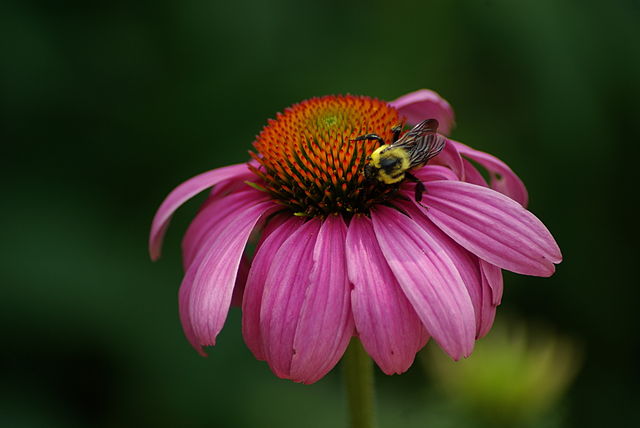
The next time you see a bug on one of your flowers, you might want to think twice before you swat it away. But how can insects improve your garden when all they seem to do is eat away at it? Some critters can be detrimental to your flowers, that’s true – but others are essential to their well-being. In this post, we’ll cover some of the benefits that bugs have to offer, and how to encourage the good ones to make a home in your yard:
Predators can eliminate pests. When it comes to gardening, there are good bugs, and there are bad bugs. The good ones are the likes of bees and butterflies, which help pollinate flowers, fruits, and vegetables. Others like aphids and caterpillars will suck out plant sap and chew leaves – not a recipe for a healthy garden. Ticks and mosquitoes might not harm your garden, but they’ll be a problem for any human that wanders close to it. The problem with using pesticides is that they kill both good and bad bugs. This will leave your garden vulnerable to an attack from critters with pesticide resistance, and there won’t be any ladybugs or lacewings left to keep them in check. So what do you do? Insects like dragonflies will eliminate the bugs that are feasting on your produce. You can attract them by planting swamp milkweed, black-eyed Susans, or Joe-Pye weed. When your garden is full of dragonflies, the damaging bugs won’t stand a chance. Plant fennel and dill to attract ladybugs – they’ll take care of any aphids causing you trouble.
Bugs will pollinate your garden. Ants, wasps, and bees will help fertilize your plants and allow your garden to flourish. This process is essential for our survival since it’s required for the production of most major food crops. Pollination is a key component in a plant’s reproductive cycle, enabling it to produce seeds. When seeds are spread, genetic biodiversity widens. Pollen will develop in the fruits and flowers on plants so that seed dispersers, like beetles and moths, will be attracted to them. All these positives are thanks to the bugs that pollinate plants.
Bee venom has medical benefits. For those that experience pain from conditions like arthritis, bee venom can be a helpful treatment. Have you considered bee therapy? These fuzzy insects are helpful to the planet and the medical world; bee venom is shown to improve high blood pressure and multiple sclerosis. But bees are facing tough times due to environmental challenges, which might make this therapy hard to come by. If we plant gardens that are full of the nectar they need, we ensure that their population remains strong. Help bees stay healthy by planting a beautiful, pesticide-free garden.
Decomposers will get rid of dead vegetation. Let the bugs do your spring cleaning for you. In addition to disposing of dead plant matter, these insects will also leave nutrients that encourage plant growth by increasing the quality of the soil. Detritivores make sure that waste does not accumulate and smother your garden. Some of these recycling bugs include ants, flies, slugs, worms, and dung beetles. But decomposers can be hard to come by in cities where soils contain high amounts of heavy metals. To encourage these insects to feast on your garden’s leftovers, you can start a worm farm or bug hotel.
Letting insects thrive can greatly improve the quality of your garden. But where are those good bugs? To enjoy a thriving patch of flowers and produce, you’ll have to attract bugs to your garden first. You can do this by planting flowers that attract bees. Russian sage is a summer flower that resembles lavender. Bees love it, but don’t make the mistake of eating it yourself – it’s poisonous for humans. Another option is the dense blazing star (Liatris spicata). It can withstand winter and will draw birds and bees to your garden in the hot season. Bugs love the lance-leaved Coreopsis; it thrives in the heat of summer, and its clumps of yellow flowers attract butterflies and bees. An adaptable flower like the pot marigold, or calendula, is bright and beautiful. When you plant these flowers in your garden, it will soon be populated by a colony of fuzzy, yellow-striped friends.
This summer, reconsider before you hose down your plants with a water jet, eradicating all bugs. Take a closer look to determine if your frustration is misguided – you might be better off leaving them undisturbed.
